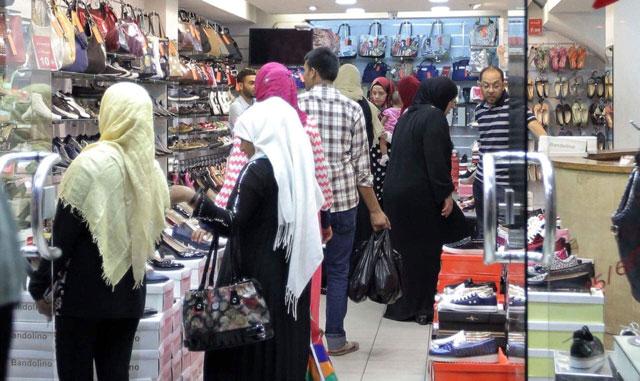You are here
‘Customer isn’t always right’, say ill-treated employees
By Maram Kayed - Oct 17,2018 - Last updated at Oct 17,2018

Workers say employees do not always support them against rude customers or harassment (Photo by Osama Aqarbeh)
AMMAN — For Yazan, a worker at a high-end clothes shop who was fired after asking a customer "not to spurt out ethnic slurs", “the customer is not always right".
The former employee recalled how a customer, who was one of the brand’s most frequent shoppers, was shown an item with ill-matched colours before saying: “What am I? A nawari from Baqaa camp?”
Baqaa, a Palestinian refugee camp in Jordan, is thought to be “a lower class area that rich customers would think being associated with is an insult”, according to Yazan, who is originally from the camp himself.
The remark, in addition to the derogatory term “nawari”, triggered the anger of the employee, who said not addressing the condescending tone and ethnic insult to his heritage would have been “a betrayal of his own people”.
“I pointed out that I’m from Baqaa, and asked her to please be more considerate of people’s feelings, after which she was silent,” he remembered, adding that he was fired the same day after the customer spoke to the manager of the shop, telling him that Yazan had “insulted and humiliated” her in front of the shop’s workers and customers.
“I got fired for having a voice and speaking out for my people, and I’d do it all over again,” the former employee underscored.
Director of Labour Watch (LW) Ahmad Awad, told The Jordan Times that “such an act by the company is an obvious violation of labour rights, and can be the base for a legitimate law case”.
Yazan’s story, along with many others, questions the long-standing customer-service rule dictating that “the customer is always right”. However, with job opportunities dramatically declining from 70,000 jobs in 2007 to 48,000 jobs in 2015, and the number of annual new labour market entrants standing at a stable 100,000 every year, according to a LW report, workers said they “sometimes have to make sacrifices”.
Lara, a worker in a lingerie shop, had a customer once scold her and say: “Are you an idiot? How hard can it be to get my request right?” after she accidently got the shopper a pink gown to try on instead of the blue one she wanted.
“Little mess-ups like that happen when you are working long shifts. It wasn’t that big of a deal. I got her the blue one immediately, and there was no need for the rudeness and insensitivity,” Lara recalled.
But, when made aware of the incident, Lara’s manager insisted that she apologise to the customer before she left.
Although the humiliation was verbal in this case, the entitlement of some customers on account of their reputable relationship with the shop or company’s owners, in addition to their large purchase amounts, could lead to further violations of labour rights.
In the case of Manar, who experienced uncomfortable and unwanted sexual advances by car dealers who dealt with her company, a sexual harassment suit followed her departure.
“It was an unwritten rule that female employees had to engage in ‘harmless flirting’, as my colleagues and superiors called it. The situation, however, was much more than just flirting, which in itself is unacceptable workplace conduct,” she told The Jordan Times.
After harshly telling off a car dealer who made several advances to Manar, the company asked Manar to “make it right” by apologising. Refusing to do so, she left the company and later filed a sexual harassment suit in Dubai, where the company’s headquarters are.
Explaining her choice to file the suit in UAE courts rather than Jordanian ones, Manar said: “I knew sexual harassment suits are somewhat still taboo in Jordan, and I also wanted to go after the whole company policy, not just the Jordanian branch, so it’s two birds with one stone.”
Related Articles
AMMAN – Around 100 residents of Amman took the streets earlier this week to raise awareness on verbal harassment some women experience when
By Charlotte PlantiveWASHINGTON — Workplace romances are fairly common, but they are becoming more regulated in the United States amid the #
AMMAN — Private school bus drivers on Wednesday protested the Ministry of Transport’s (MOT) regulations dictating that school buses which ha

















